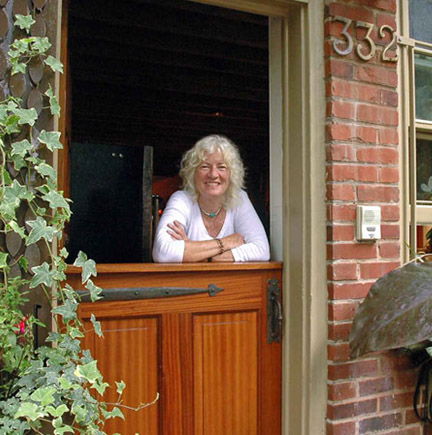 A block of brownstone row houses in West Philadelphia became my place in the world – a place where I aspired to start a business, raise a family, and help build a strong and joyful community. Making a commitment to this place and taking responsibility for its well-being was the first step I took toward helping to build a sustainable local economy in my region. After opening the White Dog Cafe on the first floor of my house in 1983, I soon began buying from local farmers. Fresh local food not only became a hallmark of my business, but also the way I learned about broader economic issues for my region and beyond.
A block of brownstone row houses in West Philadelphia became my place in the world – a place where I aspired to start a business, raise a family, and help build a strong and joyful community. Making a commitment to this place and taking responsibility for its well-being was the first step I took toward helping to build a sustainable local economy in my region. After opening the White Dog Cafe on the first floor of my house in 1983, I soon began buying from local farmers. Fresh local food not only became a hallmark of my business, but also the way I learned about broader economic issues for my region and beyond.
A farmer who supplied my restaurant once told me that successful farming is the balance of masculine and feminine energy – of efficiency and nurturing. Too much efficiency and not enough nurturing means a well run farm, but poor quality products. While too much nurturing may produce great tomatoes, but end in a failed business. I applied this concept to the larger economy and saw that our industrial food system is all about efficiency with little or no nurturing. How much can we squeeze out of the soil, the animals, the workers with as little as possible in return? How little space can we give that egg-laying hen? How little light and air? How little food and water? All to get the cheapest egg possible. No nurturing there.
It’s just as bad for pigs. In windowless factory farms mother pigs are kept in crates so small that they cannot turn around, lie down or take a single step for most of their lives. When I first learned of these conditions in 1999, I was horrified to think that the pork we were serving in my restaurant must come from these animal factories, as most all pork in our country does. I went into the kitchen and announced, “Take all the pork off the menu – the bacon, the ham, the pork chops. We cannot be part of this cruel and unhealthy system.” In our search for a humane source, our supplier of free-range chickens and eggs told us of a neighbor who raised pigs on pasture. We began buying two whole pigs a week, and our chef created recipes to use all the parts of the meat.
Read more: http://theeconomicsofhappiness.wordpress.com/2014/10/19/loving-local-place-economy-and-community/























